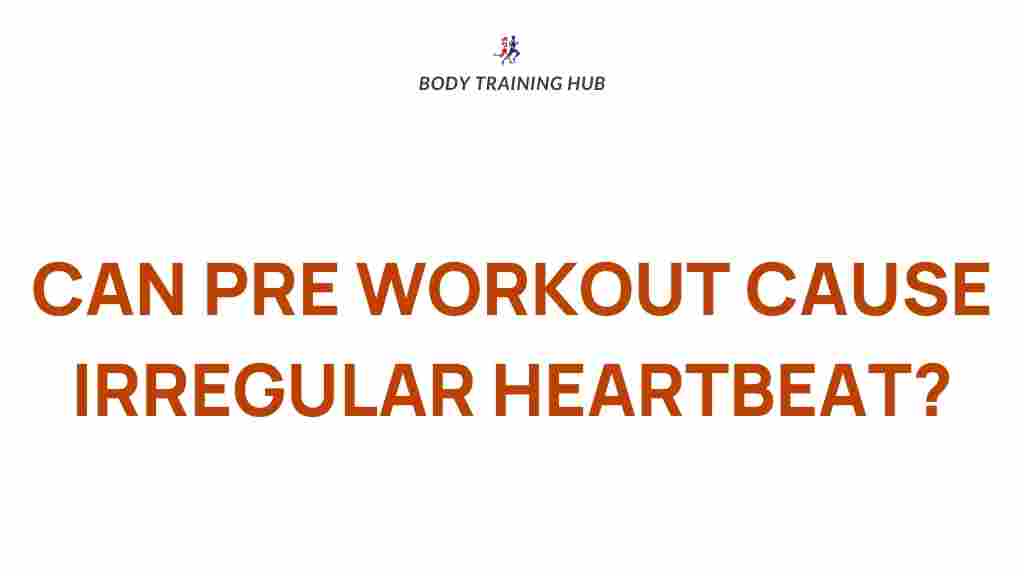Uncovering the Truth: Can Pre-Workout Supplements Trigger Heart Palpitations?
As fitness enthusiasts strive to enhance their performance, pre-workout supplements have become increasingly popular. These products promise improved energy, endurance, and focus during workouts. However, many users have reported experiencing irregular heartbeat or heart palpitations after consuming these supplements. This article aims to explore the potential risks associated with pre-workout supplements, their impact on cardiovascular health, and whether they can indeed trigger heart palpitations.
Understanding Pre-Workout Supplements
Pre-workout supplements are designed to boost your energy and improve your workout performance. They typically contain a combination of ingredients, including:
- Caffeine: A stimulant that can enhance energy and focus.
- Beta-Alanine: An amino acid that may improve endurance.
- Creatine: A compound that can enhance strength and power.
- BCAAs: Branched-chain amino acids that may reduce muscle soreness.
- Various vitamins and minerals: To support overall health and performance.
While these ingredients can be beneficial for fitness enthusiasts, they can also pose risks, especially when taken in excessive amounts or by individuals with certain health conditions.
How Do Pre-Workout Supplements Affect Heart Health?
The primary concern regarding pre-workout supplements and cardiovascular health is their potential to increase heart rate and blood pressure. Here’s how they can impact your heart:
- Caffeine Sensitivity: Individuals vary in their sensitivity to caffeine. For some, it can lead to significant increases in heart rate, potentially causing palpitations.
- Stimulant Overload: Many pre-workout supplements contain multiple stimulants, which can amplify heart rate responses and may lead to an irregular heartbeat.
- Dehydration: Some ingredients may increase the risk of dehydration, which can strain the heart and lead to palpitations.
Identifying the Risks of Pre-Workout Supplements
While pre-workout supplements can enhance exercise performance, it’s essential to understand the potential risks associated with their use. Here are some factors to consider:
1. Pre-existing Health Conditions
Individuals with existing heart conditions or hypertension should consult a healthcare professional before using pre-workout supplements. Certain ingredients may exacerbate these conditions.
2. Ingredient Interactions
Combining pre-workout supplements with other stimulant-containing products (like energy drinks) can increase the risk of heart palpitations. Always read labels to understand what you are consuming.
3. Dosage Concerns
Taking more than the recommended dosage can lead to increased side effects, including heart palpitations. Always adhere to the serving sizes suggested by the manufacturer.
4. Timing and Hydration
Taking pre-workout supplements close to the time of exercise without adequate hydration can lead to adverse effects, including increased heart rate and potential palpitations.
Signs of Heart Palpitations and When to Seek Help
Heart palpitations are characterized by the sensation of a rapid or irregular heartbeat. It’s crucial to recognize when these symptoms require medical attention. Watch for the following signs:
- Duration: If palpitations last for more than a few seconds or occur frequently.
- Accompanying Symptoms: Chest pain, shortness of breath, dizziness, or fainting.
- Personal History: If you have a history of heart disease or related conditions.
If you experience any of these symptoms, it’s advisable to seek medical help immediately.
Managing or Preventing Heart Palpitations
Here are some tips to help manage or prevent heart palpitations while using pre-workout supplements:
- Consult a Doctor: Before starting any supplement, especially if you have heart concerns.
- Monitor Your Intake: Keep track of how much caffeine and other stimulants you consume throughout the day.
- Stay Hydrated: Drink plenty of water before, during, and after your workout to minimize dehydration risks.
- Choose Wisely: Opt for pre-workout supplements with transparent labels and known ingredients.
- Listen to Your Body: If you experience any adverse effects, consider discontinuing use and consulting with a healthcare professional.
Exercise, Fitness, and the Role of Supplements
Exercise is vital for maintaining a healthy lifestyle and can significantly improve your cardiovascular health. However, the incorporation of supplements, like pre-workouts, should be approached with caution. Here are some considerations:
1. Importance of a Balanced Diet
Before relying on supplements, focus on a balanced diet rich in nutrients that support your fitness goals. Foods high in protein, complex carbohydrates, and healthy fats can provide the necessary energy for workouts.
2. Natural Alternatives
Consider natural alternatives to pre-workout supplements, such as:
- Bananas: A great source of natural sugars and potassium.
- Oatmeal: Provides long-lasting energy through complex carbs.
- Green Tea: Contains caffeine and antioxidants without the jitters.
3. The Role of Hydration
Staying hydrated is crucial for optimal performance. Dehydration can lead to increased heart rate and palpitations, so ensure you’re drinking enough water before and during your workouts.
Troubleshooting Tips: What to Do if You Experience Palpitations
If you experience heart palpitations while using pre-workout supplements, consider the following troubleshooting tips:
- Stop Using the Supplement: Discontinue use immediately if you notice palpitations.
- Rest: Take a break from exercising and allow your heart rate to return to normal.
- Deep Breathing: Practice relaxation techniques to help calm your heart.
- Note the Symptoms: Keep track of when the palpitations occur and any other symptoms for your healthcare provider.
- Consult a Healthcare Professional: If symptoms persist, seek medical advice to rule out serious conditions.
Conclusion
In conclusion, while pre-workout supplements can enhance fitness performance, they may also trigger irregular heartbeat or heart palpitations in some individuals. Understanding the ingredients, recognizing the risks, and listening to your body are crucial steps in ensuring your cardiovascular health remains intact. Always consult with healthcare professionals, especially if you have pre-existing health conditions or experience symptoms of concern.
For more information on safe exercise practices and supplements, consider visiting this resource. Additionally, if you’re looking to explore natural alternatives for your workouts, check out our guide on fitness nutrition.
This article is in the category Myths & Facts and created by BodyTraining Team
